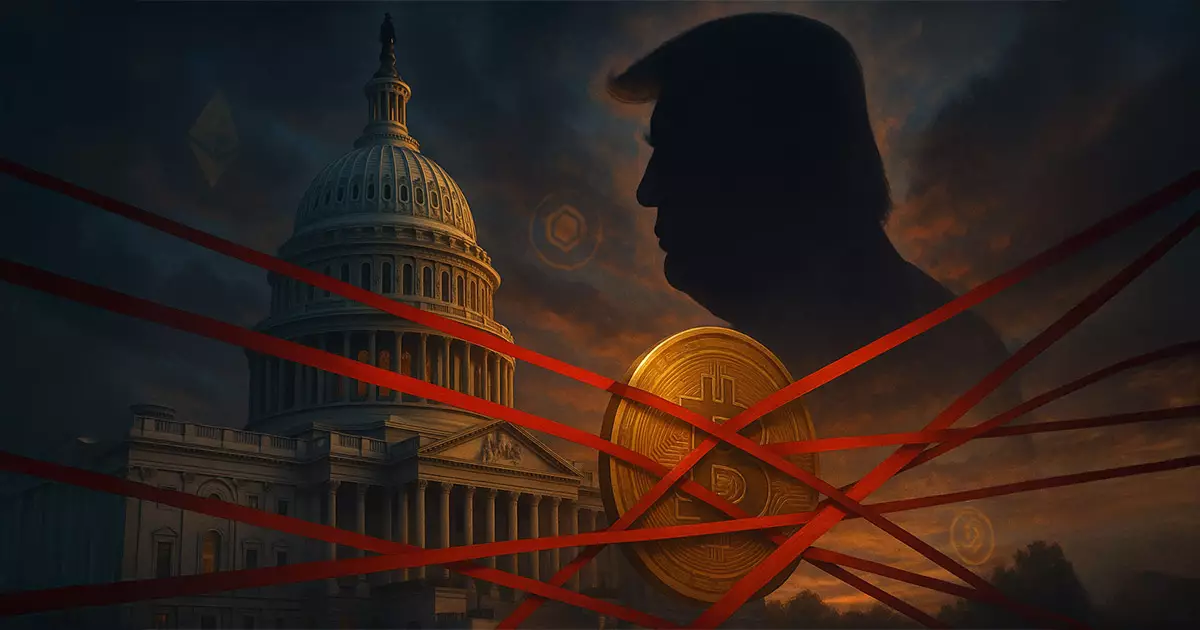The intertwining of politics and personal profit is nothing new in the United States; however, the latest developments surrounding former President Donald Trump’s ventures in the cryptocurrency sector exemplify this troubling phenomenon. With legislation aimed at regulating stablecoins facing nasty roadblocks, discussions are fueled by concerns over ethical implications tied to Trump’s financial interests in the crypto market. Let’s dissect how these ventures impede significant policy progress and what this says about the current political environment.
Policy at a Standstill Due to Personal Ventures
The ongoing debate around the Guiding and Establishing National Innovation for U.S. Stablecoins (GENIUS) Act illustrates a critical juncture in U.S. cryptocurrency regulation. Despite being heralded as a necessary bill to establish clear guidelines for stablecoin oversight, the act’s failure to pass due to the 48-49 vote in the Senate underscores the broader implications of Trump’s personal investments in the crypto space. Ryan Gilbert, founder of Launchpad Capital, lamented over the clash of personal business interests with the pursuit of vital legislation. Rather than fostering an environment where sound regulations can thrive, the involvement of a former president in a highly volatile sector raises serious questions about conflicts of interest.
The stalemate surrounding the bill is disheartening. As observed by Katrina Paglia of Pantera Capital, a point of disappointment didn’t come without the lingering realization of how personal agendas stall critical regulatory advancements. Congress’s decisions should not be swayed by former leaders looking to profit but rather informed by the need for systemic clarity in financial markets. The crypto world cannot be governed effectively while entangled in scandal and corruption.
Trump’s Personal Profits Undermine Public Trust
The ramifications of Trump’s memecoin venture have raised eyebrows much higher than the coin’s market price. According to reports, Trump made roughly $350 million from his crypto assets, which positions him not just as a former president but also as a profiteer in a market known for its speculative tendencies. This raises a vital concern: Can we trust a governance system where a former leader stands to monetarily benefit from the very regulations he could influence? Critics like Congresswoman Maxine Waters argue that Trump’s actions epitomize the corruption that pervades Washington, suggesting that his focus has shifted from improving the welfare of the American public to enriching himself and his close allies.
This concern is exacerbated by claims that Trump’s establishments control the majority of the $TRUMP memecoin’s supply, allowing them to capitalize on the excitement generated within the cryptocurrency community. It’s a glaring example of what can happen when personal wealth and political authority intermingle. The very essence of public service should be to act in the people’s best interests, yet Trump’s ventures seem more aligned with self-enrichment.
Political Ramifications: A Broader Message
The fallout extends beyond the individuals involved, creating an opportunity for deeper skepticism about the nature of political integrity. With bipartisan lawmakers now outlining proposals like the End Crypto Corruption Act to curb similar conflicts of interest, the discourse in Washington has shifted toward an alarming predicament. Critics point out that allowing financial gain through cryptocurrency endorsements can potentially compromise the democratic framework that governs this country.
Members of Congress are understandably concerned with Trump’s ability to financially benefit from a market which they are expected to regulate. As Senator Mark Kelly astutely pointed out, allowing politicians to engage with crypto assets while also holding regulatory authority could lead to an environment rife with corruption. This needs to be addressed so the public can place their trust back in institutions designed to ensure fair practices and financial integrity.
The Bigger Picture: Challenging Corruption in Governance
While Trump’s past might seem specific to his administration, what’s playing out in the crypto space highlights a much broader issue of political accountability and corruption. The ability of influential figures to profit from their decisions, particularly in non-traditional financial sectors like crypto, is becoming a contentious battleground for credibility in government. The unsettling reality is that as Congress grapples with complex regulations, ethics remain compromised by looming concerns over personal gain, influencing the very heart of democracy.
This ongoing drama will continue to play out as negotiations and discussions ensue, but one thing is certain: the need for stringent ethical standards preventing lawmakers from profiting off their positions has never been more evident. The equation is simple; the harder you work on self-enrichment, the less you contribute to meaningful governance. It’s about time policymakers and the public hold them accountable for the ramifications of their choices. The current situation calls for unwavering diligence to ensure that policy does not remain a puppet lost in a game of personal profit.

